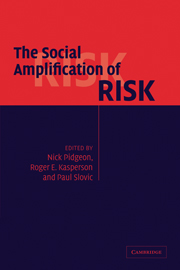Book contents
- Frontmatter
- Contents
- List of figures
- List of tables
- List of contributors
- Acknowledgments
- Introduction
- Part I Conceptual foundations
- 1 The social amplification of risk: assessing fifteen years of research and theory
- 2 The logical structure of the social amplification of risk framework (SARF): Metatheoretical foundations and policy implications
- 3 Social amplification of risk and the layering method
- 4 Institutional failure and the organizational amplification of risks: the need for a closer look
- Part II Risk signals and the mass media
- Part III Public perceptions and social controversy
- Part IV Risk ripples and stigma effects
- Part V Policy and management
- Bibliography
- Index
4 - Institutional failure and the organizational amplification of risks: the need for a closer look
Published online by Cambridge University Press: 06 July 2010
- Frontmatter
- Contents
- List of figures
- List of tables
- List of contributors
- Acknowledgments
- Introduction
- Part I Conceptual foundations
- 1 The social amplification of risk: assessing fifteen years of research and theory
- 2 The logical structure of the social amplification of risk framework (SARF): Metatheoretical foundations and policy implications
- 3 Social amplification of risk and the layering method
- 4 Institutional failure and the organizational amplification of risks: the need for a closer look
- Part II Risk signals and the mass media
- Part III Public perceptions and social controversy
- Part IV Risk ripples and stigma effects
- Part V Policy and management
- Bibliography
- Index
Summary
Mad cows and oil spills
Had Dickens been alive today, he might still have had reason to write that we live in the best of times, the worst of times. To technological optimists, on the one hand, these are indeed the best of times, and statistical proof is available in the form of life expectancy figures. On the other hand, to many of the other residents of industrialized societies, including such important European theorists as Beck (1992, 1995a) and Giddens (1990), we live in a “risk society.”
When Kasperson and his colleagues first spelled out the notion of “the social amplification of risk,” they took an important step toward helping us understand this difference in viewpoints. To date, however, much of the empirical attention has been focused on the views of individuals, particularly in the United States. This paper will argue that the work to date needs to be complemented by work that focuses on the organizations that are responsible for managing risks, and on the larger societal context in which we all live. Unlike Giddens and Beck, however, I will be focusing on the risks that are not “truly formidable.” If we truly wish to understand technological risks, and how to respond to them, I believe we will learn more by focusing not on the dramatic visions of a nuclear Armageddon, but on more mundane types of risks that have been seen both in Europe and in the United States in recent years – risks such as mad cows and oil spills, which seem highly unlikely to endanger all life on earth, but which nevertheless created significant concern among even the more highly educated members of the general public.
- Type
- Chapter
- Information
- The Social Amplification of Risk , pp. 102 - 120Publisher: Cambridge University PressPrint publication year: 2003
- 33
- Cited by



